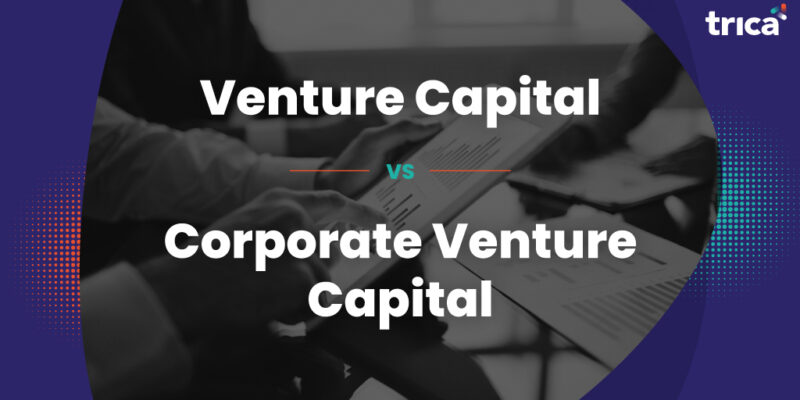
The Difference Between Venture Capital and Corporate Venture Capital
Among the critical decisions an entrepreneur has to make, one is to identify how you want to raise funds for a startup – via Independent Venture Capital (IVC) or Corporate Venture Capital (CVC).
Before making that decision, you must understand the difference between the two. This article will explain the basics of Independent Venture Capital and Corporate Venture Capital and their key differences.
What Is Venture Capital?
We know about startups like Airbnb, Uber, WeWork, and Wize. All of them raised their initial funds through venture capital, and this approach enabled them to kick-start operations and expand when only some people were ready to invest in their idea.
Gompers and Lerner refers to venture capital as an intermediary in financial markets, offering much-needed capital to startups and upcoming ventures when attracting funds from other sources would have been very challenging.
Venture capitalists or venture capital firms are professional investors who direct funds toward profitable businesses bearing in mind the potential risks.
Independent Venture Capital (IVC)
IVC funds are typically formed by a group of General Partners (GP) responsible for managing the fund and raising third-party capital to invest. In this case, private business entities or solo investors are willing to invest capital through different channels, including company stocks and bonds.
This investment path is ridden with risks for investors as they cannot protect themselves if the venture fails. However, this approach offers lucrative returns if the company is successful.
A few popular IVCs include Blume in India, Monashees in Brazil, and Battery in the U.S.
Corporate Venture Capital (CVC)
The CVC is a subset of venture capital. It was primarily started because of an exponential rise in the number of startups in the tech space. The main aim of CVC is to gain a competitive edge and access and invest in innovative companies.
As opposed to Independent Venture Capital, CVC does not rely on third-party investment firms and does not own the companies it invests in. Here are a few popular CVC companies:
Besides the mainstream tech industry, CVCs are becoming increasingly popular in other sectors, including telecommunication and biotechnology.
Independent Venture Capital and Corporate Venture Capital – Key Distinctions
Although IVC and CVC funds primarily focus on value creation, there are some key differences regarding the funds’ goal, structure, and management.
1. Goal of the Fund
The main goal of IVC funds is to optimise and maximise financial investment returns and ensure that investors are satisfied. Therefore, the main objective of IVC funds is primarily a company’s growth, with a clear intent of exiting (via an IPO or an M&A transaction) at the highest possible valuation at that point.
The objective of CVC funds differs from IVC funds, and the focus is to create strategic returns for startups and go beyond attaining positive financial returns. These returns can come in myriad ways, including developing new capabilities, innovation, knowledge, and more.
2. Length of Investment
Typically, the investment horizon for IVC funds is around ten years before the investors see profits. Often, this tenure gets extended by two to three years for sufficient time to distribute the final portfolio holdings.
On the other hand, CVC funds have a medium to the long-term investment horizon. In most cases, CVC funds do not have a fixed term and are open-ended.
3. Performance Evaluation
GPs are under significant pressure to generate financial returns, and if they cannot do so, raising funds in the future will be difficult. Hence, financial returns are the main parameter one should consider while evaluating the performance of IVC funds.
However, when we speak about CVCs, financial returns are not the only indicator of a fund’s performance. Here, strategic returns are measured to evaluate the performance of CVCs. However, measuring strategic returns is tricky and more complex than measuring financial returns. Strategic returns are typically measured by considering a few indicators, including the number of pilot projects implemented with startups, the number of partnerships, and more.
4. Fund Structure
Typically, the relationship between limited and general partners shapes the external structure of the IVC fund. In this scenario, limited partners are the investors, and the venture capital firm is the general partner. LPs offer funds for investments, and the GPs manage the fund. The fund is founded in jurisdictions where investors can get some tax benefits.
On the other hand, the fund structure in CVCs can either be internal or external. Both structures have their pros and cons. For a CVC fund, an external structure paves the way for seamless and streamlined investment management and higher accountability for the performance of investments.
5. Incentives for Fund Management
When we speak about receiving incentives for fund management, IVC managers come out on top. Typically, they earn more incentives than managers in charge of CVC funds. They receive a profit share (carried interest) if the fund meets its financial objectives on top of an annual management fee. On the other hand, compensation for CVCs comprises a salary and a bonus structure.
Final Thoughts
Independent and Corporate Venture Capital funds should forge mutually beneficial relationships with startups. Entrepreneurs must understand how they add value and then consider future strategic and exit alternatives.
In most cases, an IVC fund will likely invest in a startup before a CVC fund comes into the picture. They add value by helping new businesses with raising capital, and governance. A CVC fund also adds value to a startup in the same way. However, besides capital funding, CVCs bring endorsements from established corporate investors and help build partnerships with diverse and large networks.
We hope you understand the critical differences between Independent Venture Capital and Corporate Venture Capital. If you are wondering which approach works best for your startups, get in touch with trica today!
ESOP & CAP Table
Management simplified
Get started for free




